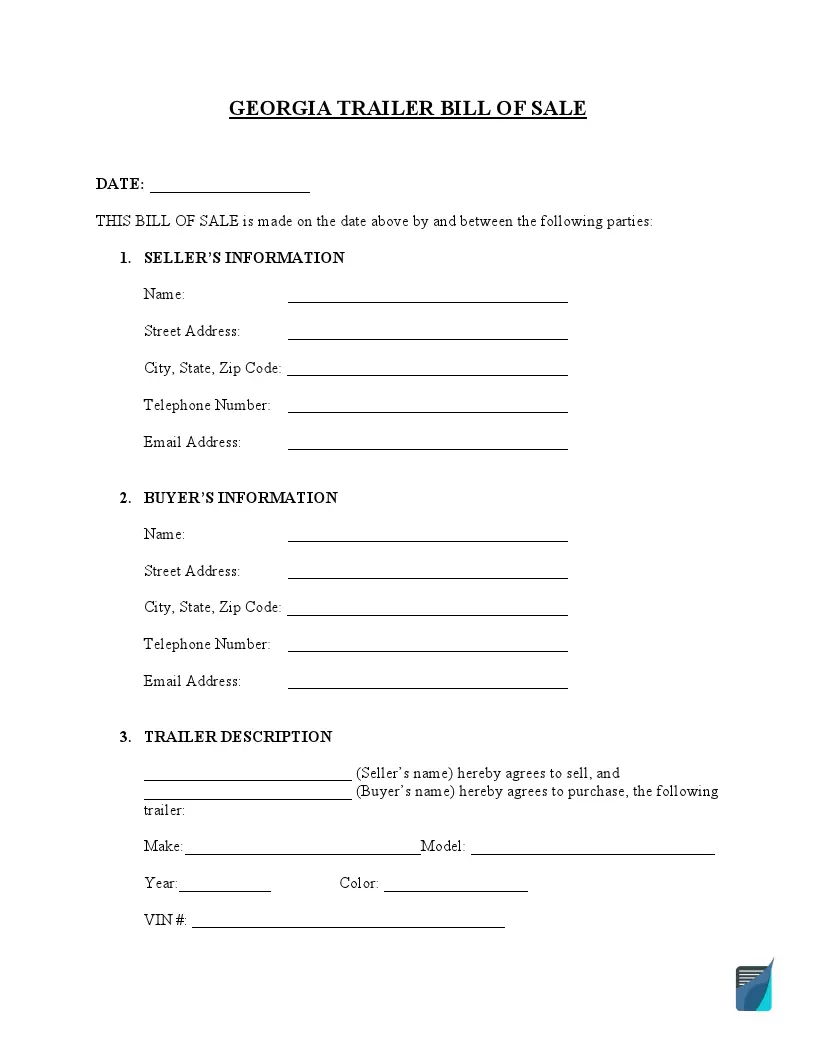
The Georgia trailer bill of sale (form T-7) is a vital supplementary document allowing the legalization of a private trailer sale between two Georgia residents (or one resident and one non-resident). This form contains all critical information about the sale including the model of the vehicle, its year of manufacture, the actual condition, sale price, and personal details of the buyer and seller. There can be boat trailers, vessel trailers, and trailers for the transportation and storage of some equipment. No matter what type of trailer you possess, it needs to be registered with the Georgia Department of Revenue.
Georgia bill of sale templates – discover more about bills of sale for other things in Georgia.
To make sure you know all the specifics of using bills of sale, visit the page with our bill of sale guide – https://formspal.com/bill-of-sale/.

Create and Print a Free, Valid Trailer Bill of Sale Online Now!
Build Your Document
Answer a few simple questions to make your document in minutes
Save progress and finish on any device, download and print anytime
Your valid, lawyer-approved document is ready
. or download your Georgia Trailer Bill of Sale Form as a PDF file Create and Print a Free, Valid Trailer Bill of Sale Online Now! Table of ContentsRegistration of a trailer is required for Georgia residents purchasing a new one (within seven days after the purchase) and for new residents coming to live in Georgia with their trailers previously registered outside the state (they need to file documents for the registration within 30 days after moving to Georgia). A failure to register a trailer on time is punished with a $100 fine.
Official registration of a vehicle in Georgia means obtaining new plates and a new certificate of title. Exemptions for titles include vehicles older than 1962, boat trailers, cranes, golf carts, etc. In line with Georgia laws, the registration of a new vehicle should be done together with title application, but as trailers do not require titles, only registration is done by submitting the bill of sale form, the personal identification data of the owner, and paying the sales and use tax (SUT) (applicable to the vehicles exempt from the title tax). In Georgia, the SUT tax amount is calculated based on the vehicle’s purchase price and fair market value.
Homemade trailers should also be registered in the local County Tag Office to get serial plates permitting the use of the vehicle on Georgia roads. To get the title and plates for your trailer, you need to submit the following documents:
You will also need to pay a $12 license plate fee and an Ad Valorem tax/ SUT relevant to your trailer type. After the plate is affixed to your trailer, the local agent of the transportation department certifies this by completing Form T-22C.
Once you get the license plate affixed, you can use it as a VIN for your trailer. Homemade trailers are not assigned titles in the state of Georgia.
| Document Name | Georgia Trailer Bill of Sale Form |
| Other Name | Georgia Utility Trailer Bill of Sale |
| Relevant Link | Georgia Department of Revenue |
| Registration Fee | $12 |
| Avg. Time to Fill Out | 8 minutes |
| # of Fillable Fields | 57 |
| Available Formats | Adobe PDF; Microsoft Word |
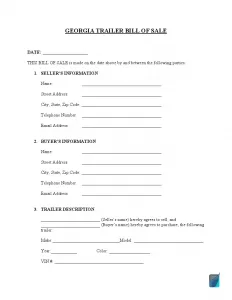
The filling advice is intended around the trailer bill of sale form for free created by our team. Nevertheless, you should opt for the official form should it be provided by your local authorities.

Step 1: Specify the document’s creation date.
Step 2: Enter the purchaser’s and seller’s details:

Step 3: Type in the details of the trailer:
 of sale details" width="834" height="234" />
of sale details" width="834" height="234" />
Step 4: Enter the payment method and amount.
Type in the transaction date and specify the entire sum that must be paid for the trailer. You will have to also indicate the sale method the purchaser will use:
The next step is deciding on the form of payment:
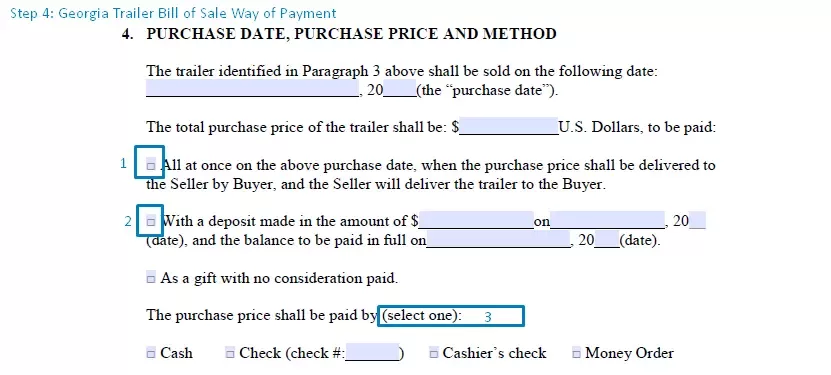
The last thing to do in this section is to select whether or not all applicable taxes are included in the final cost.
Step 5: Go through standard terms and make sure that both parties understand them.
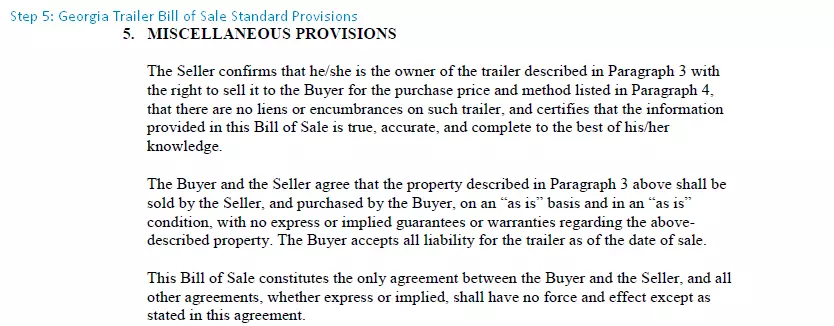
These usually state that the purchaser obtains the object sold in “as-is” condition and is liable for it once the transaction is finished.
Step 6: Place your signature(s) in the corresponding areas.
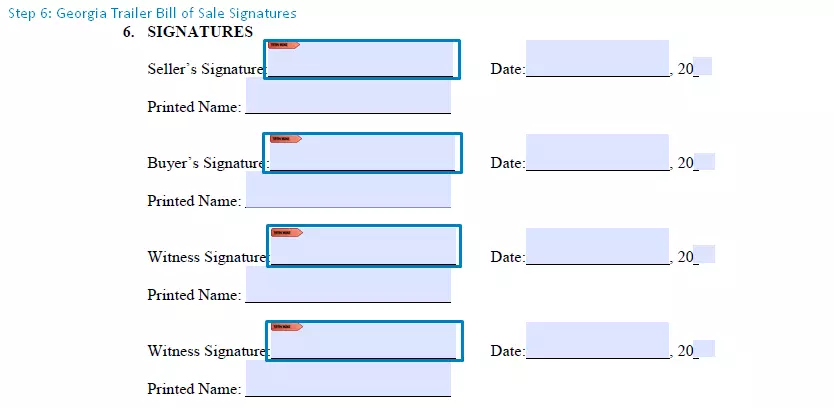
The buyer is typically not required to sign the bill of sale. Nevertheless, it’s recommended to have the form signed by all parties. To be sure, the parties can choose somebody who’ll witness the transaction and sign the document as well.
Step 7: Use the help of a notary public
Although notarization is almost never required, it may serve as yet another way to guard against legal issues.

The buyer needs to get the original bill of sale since it is often needed for the title transfer. There are two approaches here: you should either prepare and sign two identical forms or get a copy for the seller to have.